|
|
|
Sort Order |
|
|
|
Items / Page
|
|
|
|
|
|
|
| Srl | Item |
| 1 |
ID:
106540
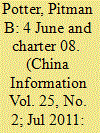

|
|
|
|
|
| Publication |
2011.
|
| Summary/Abstract |
This article will examine the dissident human rights document circulated in China under the title 'Charter 08' by comparison with the 4 June 1989 democracy movement as exercises of popular remonstrance. The document entitled 'Charter 08' juxtaposes continued deprivation of human rights in China with continued reliance on ineffective and corrupt institutions of the rule of law and concludes that China has many laws but lacks the rule of law. Charter 08 offers a series of principles and policy proposals for wide-ranging legal and political reform, from constitutional reforms to a proposal for a truth and reconciliation process that will confront the tragedies of China's political history and build a foundation for future unity. The 4 June democracy movement in Beijing and other cities in China centred on similar concerns around political and legal reform - particularly the need to curb corruption and build institutional restraints against abuse of power by officials. This article will examine similarities and differences between Charter 08 and 4 June as a way to further understanding of the potential legacy of Charter 08 in the discourse of political and legal reform in China.
|
|
|
|
|
|
|
|
|
|
|
|
|
|
|
|
| 2 |
ID:
146544
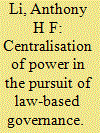

|
|
|
| 3 |
ID:
176139
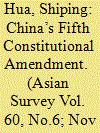

|
|
|
|
|
| Summary/Abstract |
The policy orientations reflected in the fifth amendment to China’s constitution combine some elements of Maoism (an emphasis on ideology, the party, and personality cult); some of the constitutional formality of the Republican era (1912–1949), such as Sun Yat-sen’s Wuquan Xianfa (Five Powers Constitution); and some elements of the legal tradition of China’s imperial past. These policy orientations were justified by a Maoist philosophical voluntarism: the relative detachment between the “economic base” and the “superstructure” justified the persistence of the Chinese cultural tradition and the notion that political reform does not have to accompany economic reform. On those areas that do not represent an imminent threat to the regime, such as economics and law in general, the fifth amendment is purposely vague, to give the regime flexibility in policymaking.
|
|
|
|
|
|
|
|
|
|
|
|
|
|
|
|
| 4 |
ID:
114557
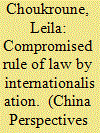

|
|
|
|
|
| Publication |
2012.
|
| Summary/Abstract |
Upon accession to the WTO, China committed to a series of specific obligations often referred to as "WTO+," aimed at the progressive transformation of the Chinese legal landscape. While one cannot ignore a number of very significant achievements as well as a true political responsiveness to other WTO members' concerns, China has not been willing to grasp the WTO opportunity for domestic legal reforms as much as observers, and some Chinese leaders, had hoped for. This incomplete normative revolution now creates tensions between WTO members, as evidenced by an increasing number of disputes shedding a direct light on the lack of transparency in the Chinese legal system. Ten years later, this piece reflects upon predictions about Chinese "rule of law by internationalisation," while putting China's legal reform into a broader political perspective.
|
|
|
|
|
|
|
|
|
|
|
|
|
|
|
|
| 5 |
ID:
129687
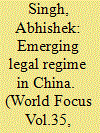

|
|
|
|
|
| Publication |
2014.
|
| Summary/Abstract |
The Chinese Communist Party (CPP), which was established in 1929, successfully unified mainland China in 1949 and founded a new nation Peoples Republic of China (PRC). In the next three decades, the communist government tried to safeguard and built the nation in principle with Communist-Maoist ideology both economically and politically. During this period, the function of law and the legal system was to serve as an instrument for the ruling communist government at large. As a result, the scope for proper legal regime in China suffered significantly from the chaos and disorder caused by endless class struggle.
|
|
|
|
|
|
|
|
|
|
|
|
|
|
|
|
| 6 |
ID:
126159


|
|
|
|
|
| Publication |
2012.
|
| Summary/Abstract |
The decade following the terrorist attacks on September 11, 2001, and ensuing anthrax exposures that same fall has seen significant legal reforms designed to improve biopreparedness nationally. Over the past 10 years, a transformative series of legal changes have effectively (1) rebuilt components of federal, state, and local governments to improve response efforts; (2) created an entire new legal classification known as "public health emergencies"; and (3) overhauled existing legal norms defining the roles and responsibilities of public and private actors in emergency response efforts. The back story as to how law plays an essential role in facilitating biopreparedness, however, is pocked with controversies and conflicts between law- and policymakers, public health officials, emergency managers, civil libertarians, scholars, and others. Significant legal challenges for the next decade remain. Issues related to interjurisdictional coordination; duplicative legal declarations of emergency, disaster, and public health emergency; real-time legal decision making; and liability protections for emergency responders and entities remain unresolved. This article explores the evolving tale underlying the rise and prominence of law as a pivotal tool in national biopreparedness and response efforts in the interests of preventing excess morbidity and mortality during public health emergencies.
|
|
|
|
|
|
|
|
|
|
|
|
|
|
|
|
| 7 |
ID:
106258
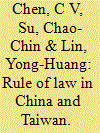

|
|
|
|
|
| Publication |
2011.
|
| Summary/Abstract |
This paper argues that Taiwan and China should sidestep the issue of what constitutes "one China" and instead improve the rule of lawin their respective areas, which could lead to a better system of government. One element of a better system is prosperity, which both sides are quite keen on. But the remaining two components- freedom and democracy- cannot be realized without rule of law. Sun Yat-sen's Three Stages of NationalReconstruction offers a viable framework for the development of the rule of law on the two sides of the Taiwan Strait.
The rule of lawinChina is,with a fewnotable differences, at a similar stage of development as it was in Taiwan under martial law. Such a difference in the two governments' legal development could derail their efforts toward closer ties.
China has to overcome many challenges before it can undertake legal reform; however, there is reason to believe and hope that the development and maturation of its legal system will continue. Discussions centered around "clean and efficient government and corporate governance" would help Taiwan and China take the first of many practical steps to accelerate cross-Strait exchange and relations.
|
|
|
|
|
|
|
|
|
|
|
|
|
|
|
|
| 8 |
ID:
118678
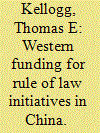

|
|
|
|
|
| Publication |
2012.
|
| Summary/Abstract |
Recent research has suggested that Western donors working in China have channelled most of their funds to government-affiliated entities, including state-affiliated think tanks, academic institutions, and government agencies, rather than to grassroots civil society organisations. A more state-centred approach may have made sense in the early years of the reform era, when few non-governmental organisations existed in China that could serve as effective partners to Western donors. Yet the rapid growth and development of the civil society sector in China over the last several years means that a number of new actors are doing very important work on a range of issues related to human rights and the rule of law. The author argues that Western funding for newly-formed grassroots civil society organisations is crucial to the ongoing development of Chinese civil society. In addition, because grassroots groups can often make fuller use of key advocacy tools, such as interest group mobilisation, media advocacy, and strategic litigation, they may in some cases be even more effective in pursuing progressive goals than academic or government-affiliated entities. Western donors active in China should take note of the rapidly-changing civil society landscape in China and make efforts to ensure that their funding strategies are in line with the evolving country context.
|
|
|
|
|
|
|
|
|
|
|
|
|
|
|
|
| 9 |
ID:
161160


|
|
|
|
|
| Summary/Abstract |
Denying women their right to inheritance is a problem that has been ongoing in some parts of Egypt for too long. The chances of disallowing women their inheritance increase when this includes agricultural land, which rural areas in Egypt perceive as the “domain of men.” Using mixed methods, this research analyzes the impact of obtaining inheritances on the lives of women and their families and explores the activities that are most influential in increasing women’s chances of attaining their inheritances. The research finds that gender equality and empowerment in matters of inheritance lead to measurable improvements in women’s lives, as well as their families’ economic well-being, health, and educational conditions, and allow a bigger role for women in decision making on household and community levels.
|
|
|
|
|
|
|
|
|
|
|
|
|
|
|
|
|
|
|
|
|